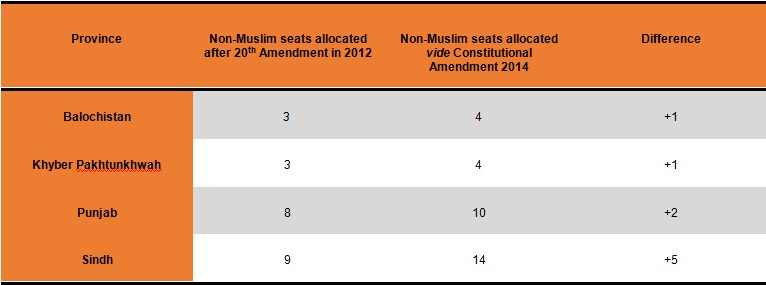Religious Minority Representation In Political Process Conspicuously Absent
Despite a lapse of 69 years, religious minority communities of the country lack representation in mainstream politics. A true representative democracy and constitutional politics are the best institutional tools to protect and advance the interests of religious minorities in any set of social conditions. Unfortunately, in Pakistan, the political representation of minorities in mainstream politics is a farce. Minorities are not granted rights on equal footing with the majority. The Constitution itself is greatly biased against the religious minorities, as Articles 41 and 42 limit the post of President, the Prime Minister and the Speaker of National Assembly to Muslims.
The question of what type of polity Pakistan should be—liberal, democratic, or Islamic—evokes different responses from different social sectors and political interests. Military leaders, mainstream political parties and Islamists have all attempted to define this relationship according to their vision of democratic development and the role of religion in society and state affairs. As a consequence of this, unending conflicts of interest and expedient coalitions, the autonomy of the civil political sphere and the general question of civil liberties and minority rights have suffered a severe setback.
At the time of Pakistan’s formation, the rhetoric included rights to freedom of religion. The forefathers of the state envisaged a free state, where each minority group would have the right to profess its beliefs freely, without fear of being persecuted. Unfortunately, soon after Pakistan’s creation, the political religious parties, purporting to be guardians of Islam, hijacked the state of Pakistan. And today, intolerance towards pluralism and interfaith harmony has seeped into the general populace and the apparatus of the state.
In Pakistan, the Hindu, Christian, Ahmadi and Hazara Shia communities are marginalized and ostracized, socially and economically. Of all the minorities groups, Ahmadis bear the most brunt. A Constitutional Amendment of 1974, declared Ahmadis as non-Muslims. But since they don’t accept their new status, they stay away from the electoral process.
A large proportion of people belonging to the minority community comprise of the labor class, working in various sectors including agriculture, brick kilns, sanitation and other menial jobs. Owing to poverty and social discrimination, the rights of religious minorities are often violated and the justice system also fails to protect them. In fact, the presence of discriminatory laws in the Constitution legitimizes the victimization of religious minorities.
Denied political representation, the minority community suffers repression at the hands of political elites, in all modern democratic states; the civil rights of citizens are recognized in the Constitution as fundamental rights, as they ensure that the subjects are able to lead an honorable life, without fear of being persecuted or discriminated on the basis of caste, creed, color, religious belief, or ethnicity.
The Constitution’s Article 51(2A) provides 10 reserved seats for religious minorities in the National Assembly, and 23 seats for minorities in the four Provincial Assemblies under Article 106. The political parties are provided reserved seats proportionally based on their numerical strength in the legislature and candidates stand elected according to the order of the list provided by the party. The process makes the exercise of representation pointless, as the minority representative becomes a pawn in the hands of the political party winning majority seats. Currently, there is no representation from minority women.
Though the state has been taking steps to streamline minorities in the system of governance, the reforms are unfortunately reduced to paper only. Vide Amendment to Article 60 of the Constitution in 2014, the following changes were made:
In 1985, the system of separate electorate was introduced for non-Muslims. Initially, there were 10 reserved seats for non-Muslims when the number of general seats was 2017. When general seats were increased to 272 in 2002, the number of seats reserved for non-Muslims remained the same, i.e. 10. The minority community strongly feels that minority representation in National and Provincial Assemblies should be increased in proportion to the population of non-Muslims.
After the Constitutional Amendment Bill 2014, minorities were given the right to dual vote by virtue of Amendment in Article 51, Subsection 6 of the Constitution, which reads, “non-Muslim has the right to cast dual vote, one vote for general seat and second vote for reserved seat in accordance with the law.”
Despite some gains in their political participation, minorities find themselves marginalized from the decision-making processes and are unable to fully represent minority communities. For instance, there was no representative from the minorities amongst the 27 members of the Parliamentary Constitutional Reforms Committee, set up for the recent 18th Amendment.
It is the same situation for the committee that has been set up to implement the Constitutional Amendments as well. Those competing from party seats often have to follow the party mandate and are unable to raise concerns related to religious minorities.
A major part of the minority population is poor, illiterate and thus socially and economically marginalized. The Asian Human Rights Commission strongly suggests that steps need to be taken for the economic empowerment of minorities. Restoration of Joint Electorate System has been a positive step to increase political participation, however political parties need to mainstream religious minorities and allocate general seats. The education syllabus in Pakistan has not been reformed so as to address lack of tolerance, hate images, lack of democratic values, etc. A new Education Policy needs to be implemented to address the problem. The 18th Amendment has been a good step but religious and other biases in the Constitution have not been addressed, therefore it has not benefited the religious minorities in any way.
The views expressed in this article are those of the author and do not necessarily represent the views of CourtingTheLaw.com or any other organization with which she might be associated.


